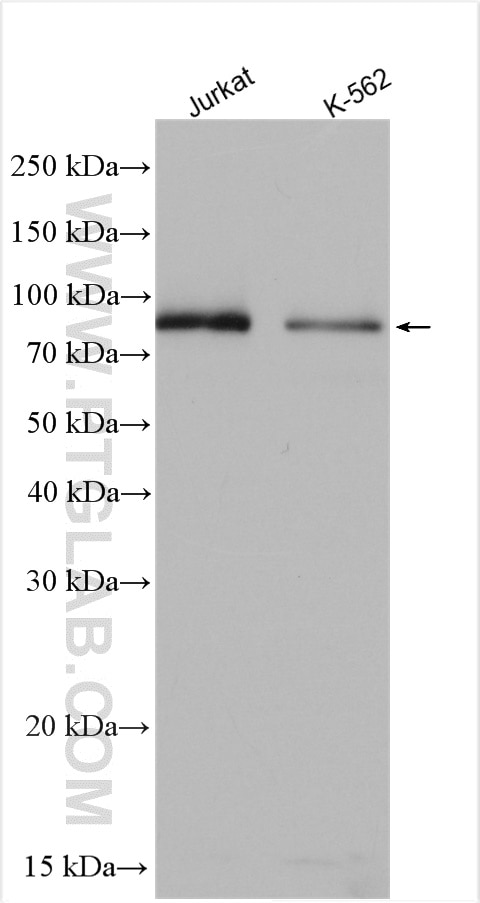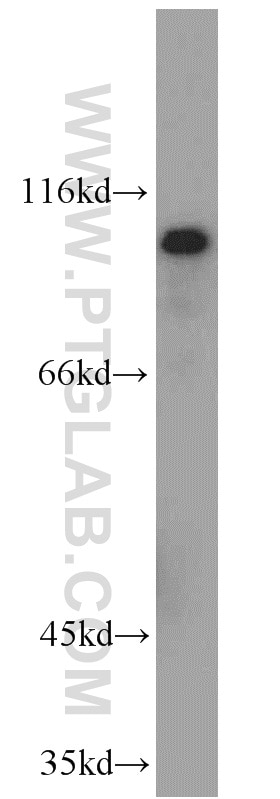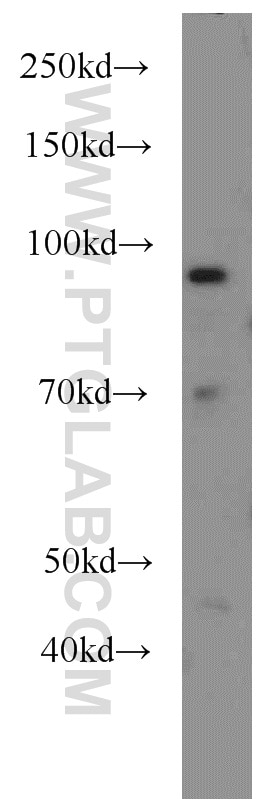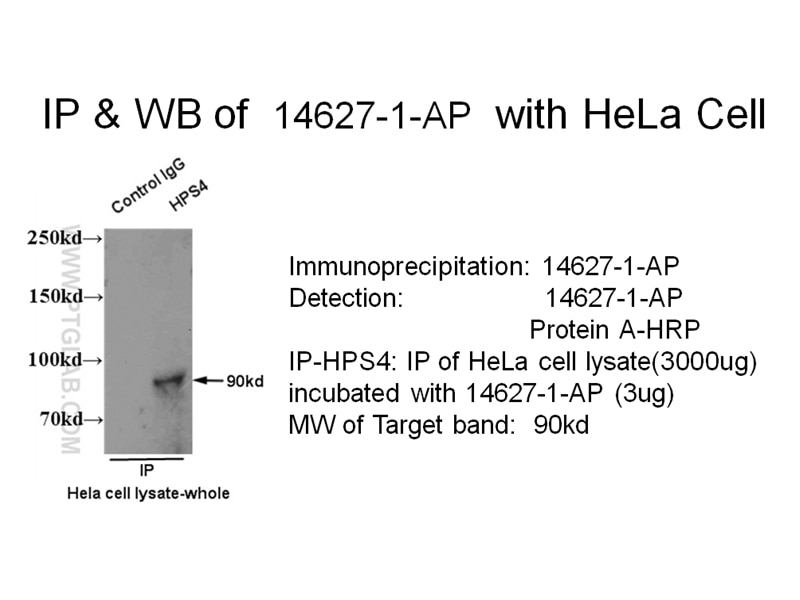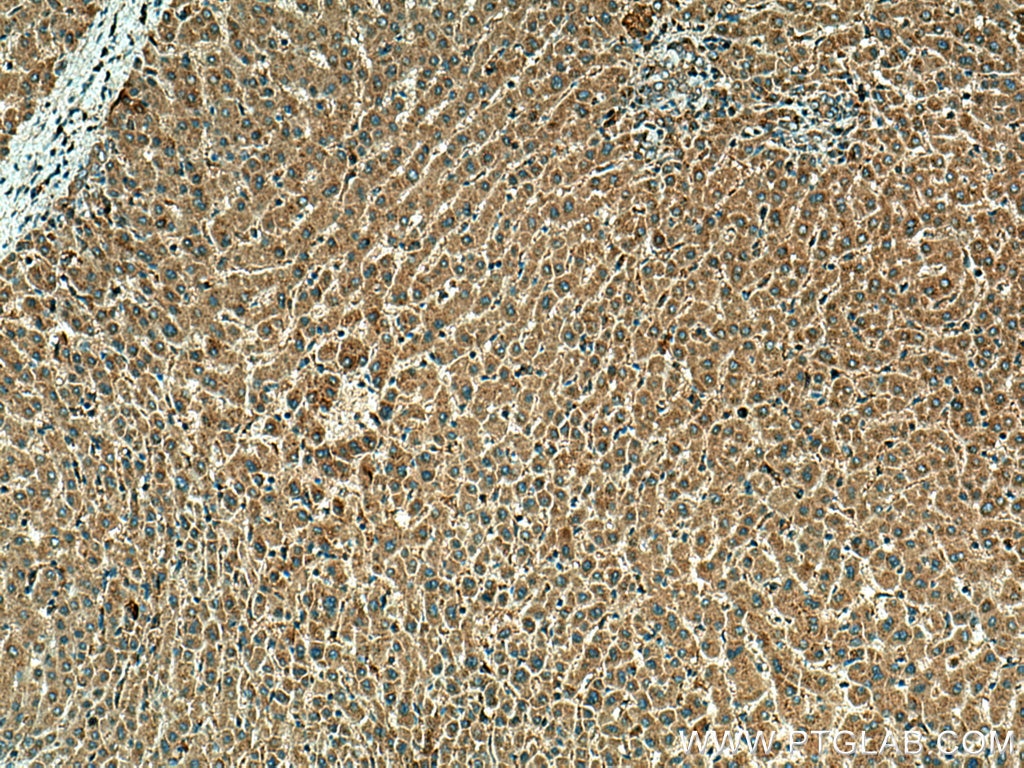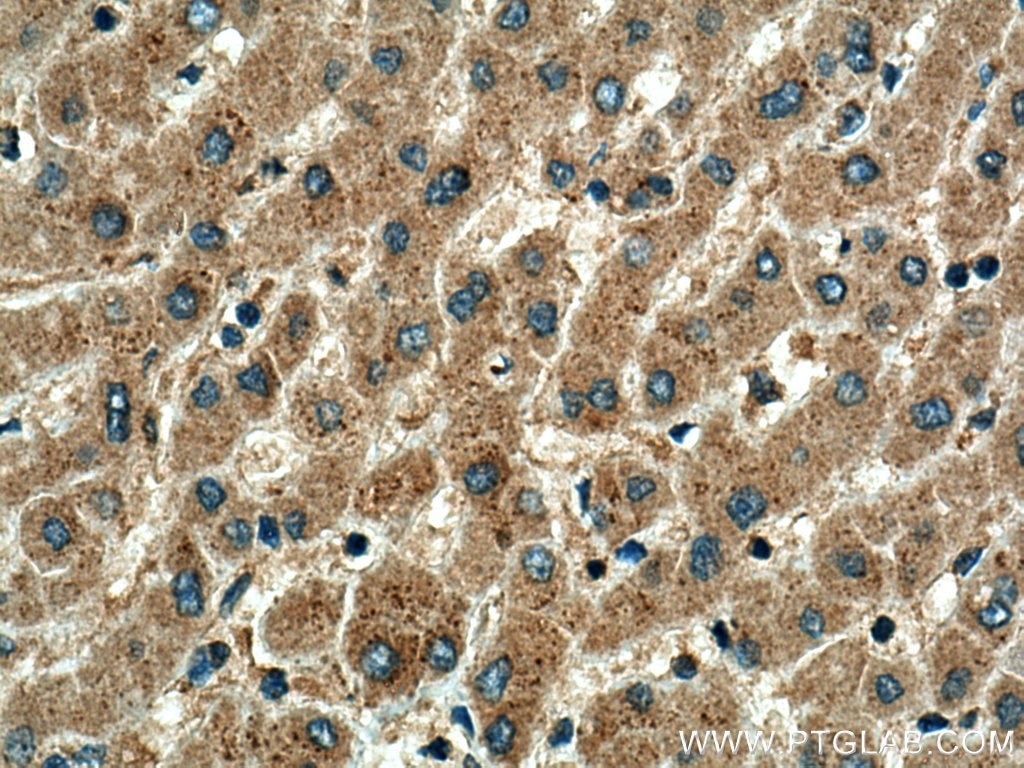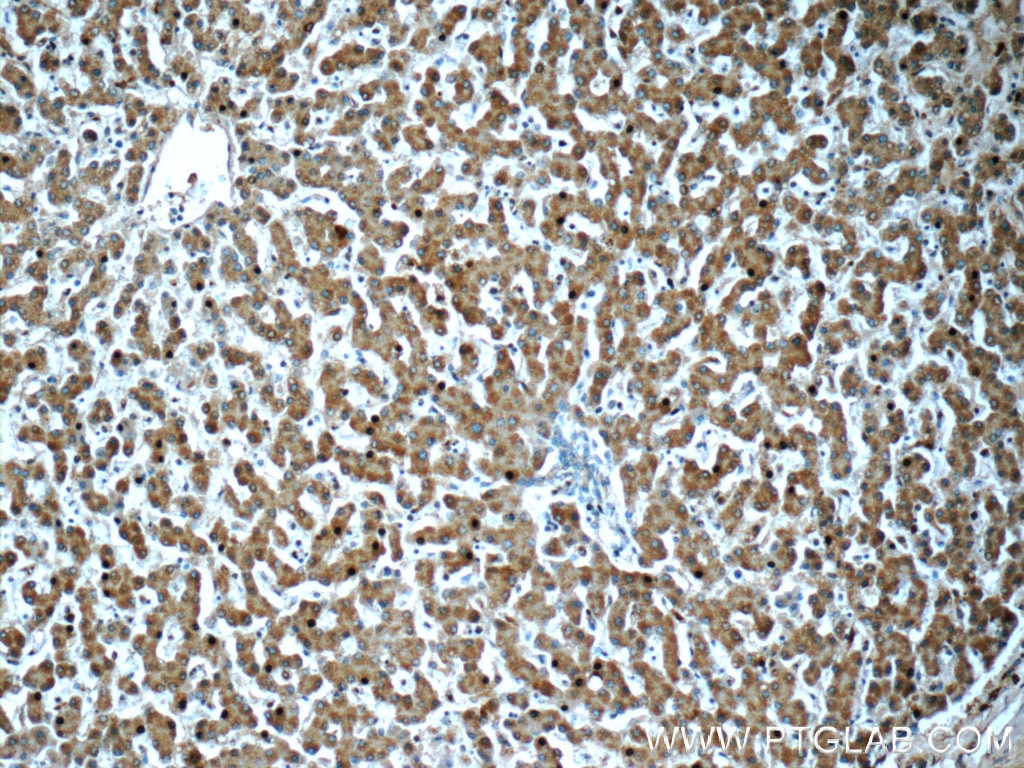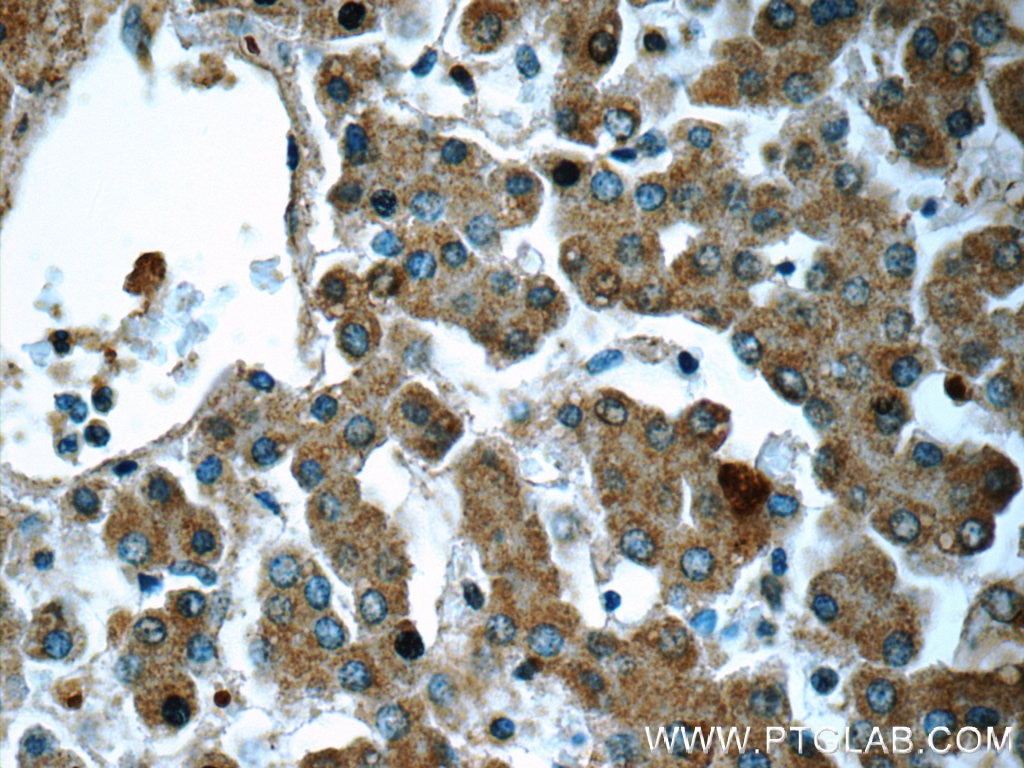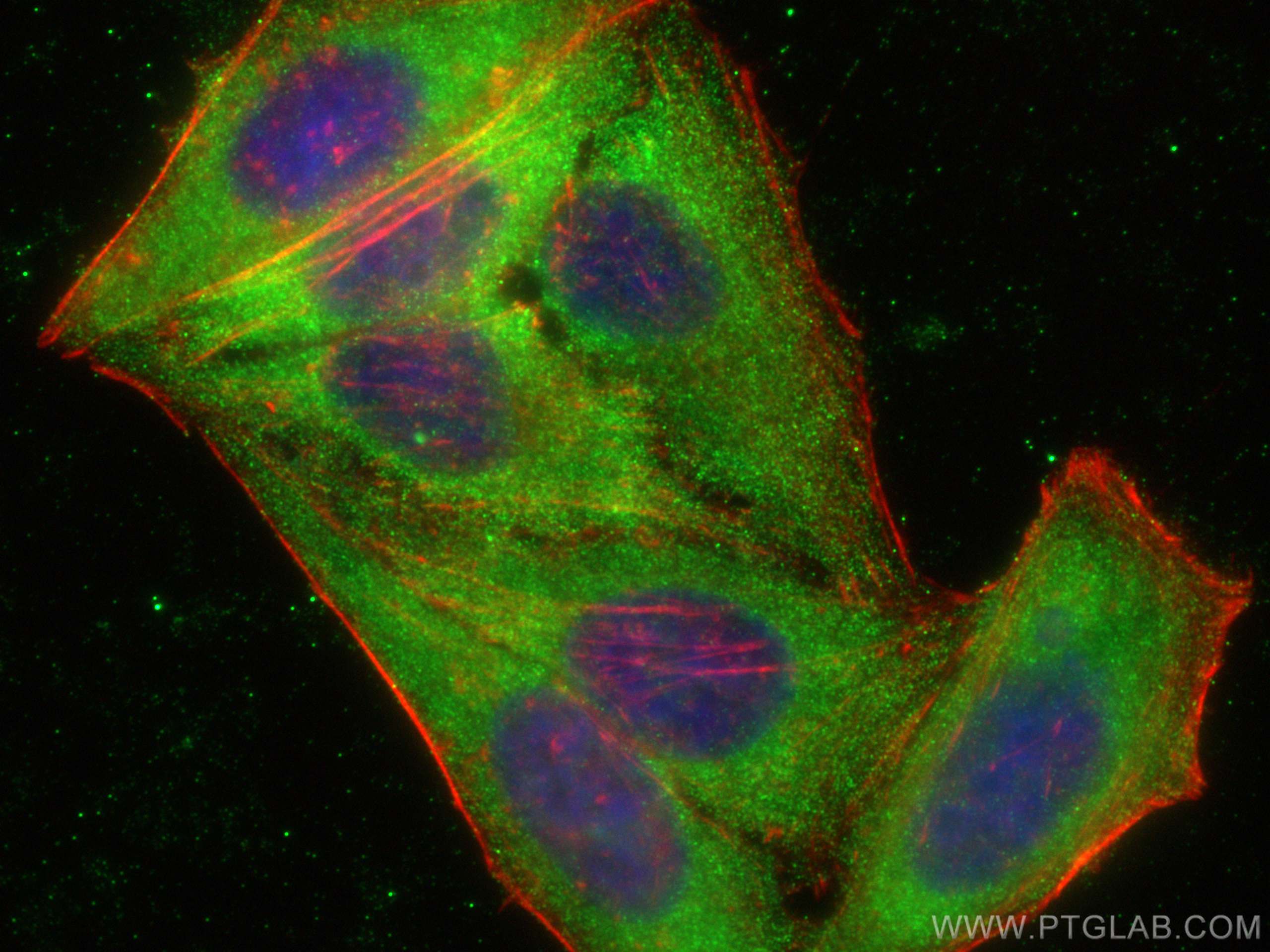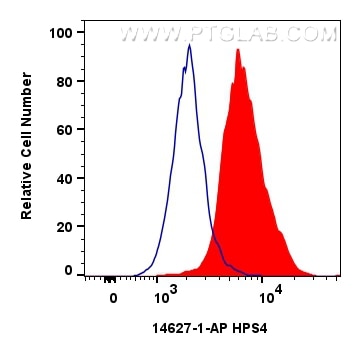HPS4 Polyklonaler Antikörper
HPS4 Polyklonal Antikörper für WB, IHC, IF/ICC, FC (Intra), IP, ELISA
Wirt / Isotyp
Kaninchen / IgG
Getestete Reaktivität
human und mehr (1)
Anwendung
WB, IHC, IF/ICC, FC (Intra), IP, ELISA
Konjugation
Unkonjugiert
Kat-Nr. : 14627-1-AP
Synonyme
Geprüfte Anwendungen
| Erfolgreiche Detektion in WB | Jurkat-Zellen, A375-Zellen, HeLa-Zellen, K-562-Zellen |
| Erfolgreiche IP | HeLa-Zellen, IP result of anti-HPS4 (14267-1-AP for IP and Detection) with HeLa cell lysate. |
| Erfolgreiche Detektion in IHC | humanes Lebergewebe Hinweis: Antigendemaskierung mit TE-Puffer pH 9,0 empfohlen. (*) Wahlweise kann die Antigendemaskierung auch mit Citratpuffer pH 6,0 erfolgen. |
| Erfolgreiche Detektion in IF/ICC | HepG2-Zellen |
| Erfolgreiche Detektion in FC (Intra) | HepG2-Zellen |
Empfohlene Verdünnung
| Anwendung | Verdünnung |
|---|---|
| Western Blot (WB) | WB : 1:500-1:1000 |
| Immunpräzipitation (IP) | IP : 0.5-4.0 ug for 1.0-3.0 mg of total protein lysate |
| Immunhistochemie (IHC) | IHC : 1:50-1:500 |
| Immunfluoreszenz (IF)/ICC | IF/ICC : 1:200-1:800 |
| Durchflusszytometrie (FC) (INTRA) | FC (INTRA) : 0.40 ug per 10^6 cells in a 100 µl suspension |
| It is recommended that this reagent should be titrated in each testing system to obtain optimal results. | |
| Sample-dependent, check data in validation data gallery | |
Veröffentlichte Anwendungen
| WB | See 5 publications below |
Produktinformation
14627-1-AP bindet in WB, IHC, IF/ICC, FC (Intra), IP, ELISA HPS4 und zeigt Reaktivität mit human
| Getestete Reaktivität | human |
| In Publikationen genannte Reaktivität | human, Maus |
| Wirt / Isotyp | Kaninchen / IgG |
| Klonalität | Polyklonal |
| Typ | Antikörper |
| Immunogen | HPS4 fusion protein Ag6202 |
| Vollständiger Name | Hermansky-Pudlak syndrome 4 |
| Berechnetes Molekulargewicht | 77 kDa |
| Beobachtetes Molekulargewicht | 70-90 kDa |
| GenBank-Zugangsnummer | BC065030 |
| Gene symbol | HPS4 |
| Gene ID (NCBI) | 89781 |
| Konjugation | Unkonjugiert |
| Form | Liquid |
| Reinigungsmethode | Antigen-Affinitätsreinigung |
| Lagerungspuffer | PBS with 0.02% sodium azide and 50% glycerol |
| Lagerungsbedingungen | Bei -20°C lagern. Nach dem Versand ein Jahr lang stabil Aliquotieren ist bei -20oC Lagerung nicht notwendig. 20ul Größen enthalten 0,1% BSA. |
Hintergrundinformationen
Hermansky-Pudlak syndrome (HPS) is a genetic disease characterized by oculocutaneous albinism, bleeding due to platelet storage pool deficiency, and lysosomal storage defects. This syndrome results from defects of diverse cytoplasmic organelles including melanosomes, platelet dense granules and lysosomes. HPS1 and HPS4 are the most frequently mutated genes associated with HPS in humans. Both of HPS1 and HPS4 are components of two complexes involved in biogenesis of melanosome and lysosome-related organelles: BLOC-3 and BLOC-4. HPS4 is supposed to interact with HPS1 and stabilize HPS1. The human HPS4 migrates at about 90 kDa on SDS-PAGE, versus its predicated molecular mass of 77 kDa.
Protokolle
| PRODUKTSPEZIFISCHE PROTOKOLLE | |
|---|---|
| WB protocol for HPS4 antibody 14627-1-AP | Protokoll herunterladen |
| IHC protocol for HPS4 antibody 14627-1-AP | Protokoll herunterladenl |
| IF protocol for HPS4 antibody 14627-1-AP | Protokoll herunterladen |
| STANDARD-PROTOKOLLE | |
|---|---|
| Klicken Sie hier, um unsere Standardprotokolle anzuzeigen |
Publikationen
| Species | Application | Title |
|---|---|---|
Am J Respir Cell Mol Biol Gene-edited MLE-15 Cells as a Model for the Hermansky Pudlak Syndromes. | ||
PLoS One Cellular and molecular defects in a patient with Hermansky-Pudlak syndrome type 5. | ||
Gene Intron retention is a stress response in sensor genes and is restored by Japanese herbal medicines: A basis for future clinical applications. | ||
Mol Genet Metab In vitro functional correction of Hermansky-Pudlak Syndrome type-1 by lentiviral-mediated gene transfer. | ||
